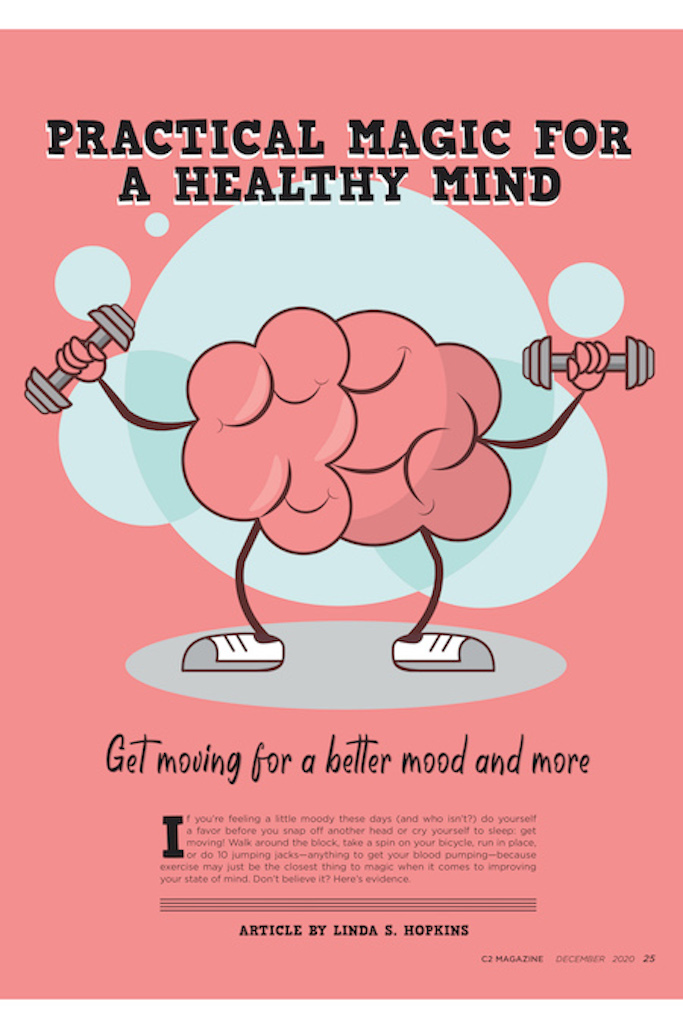A study of 1.2 million people in the U.S. has found that people who exercise report having 1.5 fewer days of poor mental health a month compared to people who do not exercise. The study included all types of physical activity, ranging from childcare, housework, lawn-mowing and fishing to cycling, going to the gym, running and skiing. All forms of exercise were associated with improved mental health, but the strongest associations were seen for team sports, cycling, aerobic and gym exercise (reduction in poor mental health days of 22.3%, 21.6%, and 20.1%, respectively), according to the study, published in The Lancet Psychiatry journal.
The reduction in number of poor mental health days was even larger for people who had previously been diagnosed with depression; exercise was associated with 3.75 fewer days of poor mental health compared with people who did not exercise, equivalent to a 34.5% reduction.
In another recent study, Texas-based psychiatrist and internationally known brain and behavior researcher Madhukar Trivedi, M.D. has shown that three or more sessions per week of aerobic exercise or resistance training for 45 to 60 minutes per session can help treat even chronic depression. Effects tend to be noticed after about four weeks, and training should be continued for 10-12 weeks for the greatest anti-depressant effect.
Maybe you’re not depressed but want to ward off the blues. Harvard researchers at Massachusetts General Hospital report that increased levels of physical activity can significantly reduce the odds of depression, even among people who are genetically predisposed to the condition. In a paper published in the Journal of Depression and Anxiety, the team reported that individuals who engaged in several hours of exercise each week were less likely to be diagnosed with a new episode of depression, even in the face of high genetic risk for the disorder.
Researchers have also explored exercise as a tool for treating and preventing anxiety disorder, the most common mental ailment in the U.S., affecting more than 40 million adults. Any exercise can help, but aerobic exercise that gets your heart rate up is particularly effective, studies show. Though not aerobic, yoga, which combines physical movement with meditation and deep breathing, can also help offset anxiety symptoms by calming the mind.
This is not to say that exercise is a cure-all. Medication will remain an important treatment option for depression, anxiety, and other mental disorders, which are notoriously complex. But the evidence is clear that physical exercise can play a vital role in both prevention of and recovery from many types of mental distress.
Practically speaking
So, if exercise is the magic bullet, why aren’t more doctors prescribing it? Maybe because it’s easier to convince patients to take a pill than to lace up their sneakers?
Some researchers blame an emphasis on the physical effects of exercise for our national aversion to activity. Physicians frequently tell patients to work out to lose weight, lower cholesterol or prevent diabetes. Unfortunately, it takes months to see the physical results of your hard work, whereas the mood boost is nearly instant.
If you are reluctant to exercise and think you could never stick with it much less enjoy it, take heart, because the brain actually performs its own magic trick. “Even small improvements in exercise levels create a positive upward spiral that increases the sensitivity of the dopamine receptors that signal reward, so that exercise will eventually become rewarding, even if that seems unimaginable at the outset,” said Psychology Today blogger Christopher Bergland, a world-class endurance athlete and founder of City Coach, a New York City-based multi-sport coaching service.
How much and how often?
As researchers continue exploring the effects of exercise on mental health, the news is mostly positive. However, frequency and intensity also play a role. Researchers from Yale University looked at data sourced from 1.2 million people in the U.S. to try to find out how much and which types of exercise are best for mental health. In the process, they found a surprise.
Those who exercised for 30 to 60 minutes three to five times per week saw the most benefit. People who were physically active for more than 90 minutes every day also saw their mental health improve, though less so. But subjects who exercised for more than 90 minutes a day or more than 23 times a month actually had worse mental health than those who did not exercise at all. Yes, there is such a thing as too much of a good thing. It’s theorized that the over-exercisers might have obsessive characteristics or addictive tendencies that could place them at greater risk of poor mental health.
According to the study’s lead author, Dr. Adam Chekroud, an adjunct assistant professor of psychiatry at Yale, people should not read this the wrong way. “The take-home is, we showed that no exercise is worse than exercise, and that those who exercise too much had the worst mental health. There is a sweet spot, for sure,” he said.
Of course, you should consult your doctor before beginning any new exercise routine. The information presented here is not a replacement for medical advice or any treatment plan you have been prescribed. But if the subject interests you, why not ask your doctor about incorporating exercise for your mental health?
Five Reasons to Get Off Your Duff
We all know that exercise is good for the body, and now research shows that it’s also good for the mind. Here are five compelling reasons to get up off the couch and break a sweat:
1. Stress relief. Exercise can help relieve stress and anxiety levels, leaving you calmer and more relaxed. This may be attributed to reduced adrenaline and cortisol and increased serotonin and norepinephrine, which regulate the brain’s response to stress. Or it could simply be that physical activity helps distract you from the day’s tensions and worries. Either way, a spot of exercise works like a potent cocktail to ease your troubled mind.
2. Improved mood. Exercise triggers endorphins, the brain’s “feel-good” neurotransmitters. Endorphins boost your mood and help you relax. A dose a day keeps the monsters away!
3. Clear thinking. Physical activity delivers oxygen to the brain and related tissues. Thirty minutes of moderate-intensity exercise, five days a week is recommended to release brain chemicals that support memory, focus, and mental concentration. Who knew that exercise could help you look smarter at work and remember where you left your keys?
4. Better sleep. Research participants consistently report physical activity as an important factor in being able to fall asleep and enhancing the quality of their sleep. A good snooze can work wonders for your energy, productivity, and outlook!
5. Higher self-esteem. Physical activity has been known to increase self-esteem and confidence, which can be related to self-perceptions of attractiveness, physical condition and strength. Get moving and love the person looking back at you in the mirror.



